PLAXIS 2D/3D 2023 Patch 2.1 v23.02.01.1079 Win x64
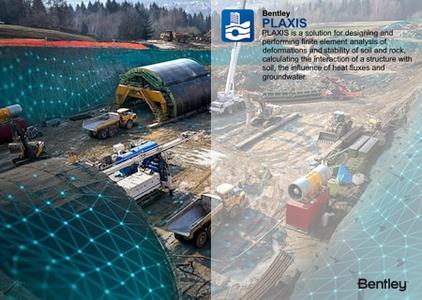
Free Download PLAXIS 2D/3D 2023 Patch 2.1 v23.02.01.1079) | 3.8 Gb
Seequent, a bussines Bentley Systems, is pleased to announce the availability ofPLAXIS 2D/3D 2023 Patch 2.1 (23.02.01.1079). Perform advanced finite element or limit equilibrium analysis of soil and rock deformation and stability, as well as soil structure interaction, groundwater, and heat flow
Owner:Bentley Systems Inc.
Product Name:PLAXIS 2D & PLAXIS 3D
Version:2023 Patch 2.1 (23.02.01.1079) Date: October 2023
Supported Architectures:x64
Website Home Page :www.plaxis.com
Languages Supported:english
System Requirements:Windows *
Size:3.8 Gb.
PLAXIS 2D/3D 2023.2.1 (23.2.1.1079), superseding PLAXIS 2D/3D 2023.2.0 (23.2.0.1059), contains the following improvements and updates compared to PLAXIS 2D/3D 2023.1:
Compatibility notes:Due to the major changes in the material database and the unit system, PLAXIS 2D/3D 2023.2.1 will be installed alongside Version 21, instead of overwriting it. When opening PLAXIS 2D/3D V21 projects with PLAXIS 2D/3D 2023.2.1, projects will automatically be saved as a converted copy with the _converted suffix and will require recalculation. When using non-SI-units, the mesh also needs to be regenerated. The PLAXIS 2D/3D CONNECT Edition V21 projects will remain unchanged. Earlier versions of PLAXIS will not be able to open files saved in PLAXIS 2D/3D 2023.2.1.
New features
Import cross section materials from Seequent Central
When importing cross sections from Central via the "Import Geometry from Central" option, the geological formation names and colours used in Leapfrog are now also used to automatically create and assign materials with corresponding names and colours to the created polygons in PLAXIS 2D. This allows the user to easily double-check and verify the correctness of the import and proceed with selecting the material models and parameter input. Importing of cross sections from Central requires a valid Geotechnical SELECT Entitlement and a Seequent Central license.
Combine polygon command
The combine polygon command available through the command line and the right mouse button context menu allows users to combine a selection of 2 or more polygons to be combined into 1 single polygon. The selection order of the polygons is considered and allows the user to determine which of the assigned materials or features are retained after the merging of multiple polygons. This feature can help in simplifying geometry imported from Central or CAD files and to optimize the numerical mesh, i.e. to combine thin layers, lenses or intrusions into the surrounding soil or rock, or to remove layer pinch outs after cutting polygons.
Import from GeoStudio 2D (Tech. Preview)
Swiftly transfer your geometry and assigned soil or rock materials from a GeoStudio 2D analysis to PLAXIS 2D using the new "Import GeoStudio 2D" option. Users can select a *.gsz project and import any of the 2D geometries contained inside the GeoStudio project file, whether it is a Slope/W, Seep/W or Sigma/W project. This feature is available as a technology preview and while the import has been tested, it will be less robust compared to regular features. Users may encounter some limitations on the supported data conversion when using this feature. Use of this feature requires a valid Geotechnical SELECT Entitlement.
Export to GeoStudio 2D (Tech. Preview)
From the Staged construction mode users can access the "Export GeoStudio 2D" option. The user can select one of the defined construction stages in PLAXIS 2D, select the intended slip surface direction, and export that as a single GeoStudio 2D *.gsz file. This allows users to continue in GeoStudio 2D for further limit equilibrium analysis on each exported phase. This feature is available as a technology preview and while the export has been tested, it will be less robust compared to regular features. Users may encounter some limitations on the supported data conversion when using this feature. Use of this feature requires a valid Geotechnical SELECT Entitlement.
Python scripting changes
SciTe version upgraded from 3.6.4 32 bits to 5.3.3 64 bits. And PySide2 was replaced with PyQt5 as the GUI framework for Python applications.
PLAXIS is part of Seequent, The Bentley Subsurface Company
PLAXIS is part of Seequent, Bentley's brand for subsurface modelling and analysis applications. As part of this transition, the versioning, logos and splash screens used in various places in the software and installer have seen some minor changes.
Other changes and improvements
- All references commands, captions and tools for the "Cable bolt element" have been renamed to "Cable element" in line with the introduction of the Cable element in PLAXIS 3D.
- The 2D to 3D converter tool now also converts cable elements.
- Changed model name in bbm64.dll from "UnSaturated model" to "Barcelona Basic Model".
- For all structural element types, SumPhase displacements now show the deformation results only since their activation.
- Upgraded ReportGenerator to 64 bits to handle bigger reports.
- The Dynamic point loads on Axisymmetric models are now correctly multiplied by the radius.
- Upgraded the OpenSSL version solving the medium-risk security vulnerability CVE-2022-4203.
Fixed issues
The following known issues have been fixed in PLAXIS 2D 2023.2.1 version:
Solved: [1230624] Groups created in Staged Construction mode are now properly loaded again,
The following known issues have been fixed in PLAXIS 2D 2023.2.0 version:
Solved: [1092643] Dynamic point loads in axisymmetric 2D models do not consider the radius
Solved: [1149242] OpenSSL vulnerability not affecting PLAXIS 2D or PLAXIS 3D
A large number of issues have been addressed, including:
[525067] Greatly reduced memory usage for cyclic SoilTest runs with many cycles
[699417] Improved performance when importing 2D geometries into PLAXIS 2D
[868989] Improved display of connection settings for Embedded Beams and for Cables
[872158] Improvements for more relevant feedback when loading material dataset information from PLAXIS CONNECT Edition V21 or earlier
[931072] Adding more than 20 data rows for an unsaturated spline, lead to a crash. This is now fixed.
[999872] Removed the incorrect calculation of a "Discharge" value when looking at the cross section results for the hydraulic gradient.
[1048114] During convergence, the total number of inaccurate plastic stress points could be off when a high number of tension cut-off points exist. This is now fixed.
[1048346] Improved clarity how the option Interpolate pore pressures work in the UI: Interpolate verically
[1058065] Fixed an issue with the AddedMass feature when switching units non-SI units, e.g. ft
[1072607] Improved visualization of PLAXIS Output overview of material information when having different drainage types in the PLAXIS model
[1075003] Removed selection of unsupported material database file extension (.plxmatx)
[1083602] Fixed an issue in steady state groundwater flow analysis when inactive interfaces have an influence on the final pore pressure field.
[1093646] Fixed an issue with assigning the the correct impermeable interface data in a groundwater flow calculation.
[1095075] In PLAXIS Output, the MaterialID for the getresults command did not show correct values. This is now replaced by a new property: .MaterialIndex
[1096247] Structural element material data tables in PLAXIS Output now show correct and complete data when having mixed types (elastic and elastoplastic)
[1099980] Cables now show correct related bond strength values in the displayed results
[1111653] The Jointed Rock model can now deal with 3 weak planes again
[1149238] Fixed an issue when generating a curve with a soil node that coincides with structural node
[1174879] Fixed an issue in the PLAXIS Output API when retrieving material dataset parameter values.
[1186220] Fixed an issue in the Python API when requesting material property values in PLAXIS Output
[1211241] When using non-metric units, PLAXIS Output would show the incorrect values for the applied pseudo-static values when looking at the calculation information table. The calculation used the correct values.
[1214798] Fixed an issue in the Seequent Central - PLAXIS 2D interoperability when obtaining cross sections
[1104790] In SoiTest we can again set the Consolidation K0 value for Triaxial test configurations larger than 1
[1227706] In some cases, the some deformation Descriptions were not added properly in the Report Generator. This is now resolved.
[1268100] Fixed a crash when adding segments to closed section in the Tunnel Designer
[1277297] Fixed an issue for some externally developed User Defined Soil Model DLLs, where stress points could incorrectly be displayed as plastic failure points in PLAXIS Output
[1283831] Retrieving Soiltest results via the Python API did not give result values. This is now solved.
[1285623] Fixed an issue that prevented the calculation of a plastic phase after a Dynamics analysis with Free-field elements.
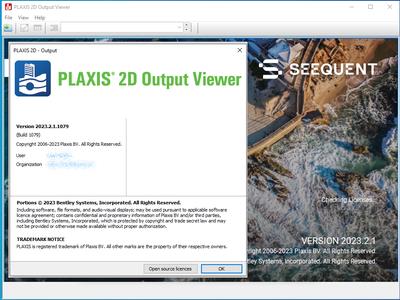
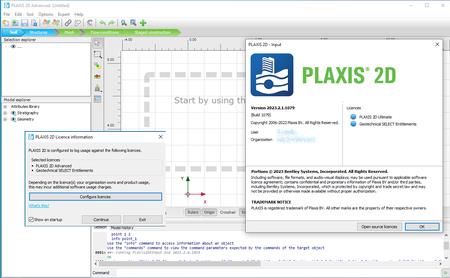
New features
Cable element
Added cable element and material type to simulate rock reinforcement like grouted cables or frictional/grouted bolts that work mostly in tension/compression. The Material definition includes the input of bond stiffness and bond strength parameters in line with rock engineering practice. Other capabilities include confining stress dependency and pre-stressing the element. The cable element is available in all product tiers.
Import of surfaces from Seequent Central (Tech. Preview)
Surfaces created in Leapfrog that have been published to Central can be imported directly into PLAXIS 3D with the new "Import Surfaces from Central" option. This allows users to create their subsurface model in PLAXIS 3D based on the contact surfaces in the Surface Chronology of the Geological Model, as well as the Topography available in the published Leapfrog project. This is a technology preview based on the triangulated surfaces implementation introduced in V22 with certain limitations to the surface representation:
. Steep transitions, sharp edges or corners present in the surface are smoothed out, i.e. open pit geometry, vertical cuts etc.
. Very complex surfaces with high triangle counts cannot be handled and will require simplification on beforehand.
. Nearly closed and closed surfaces cannot be imported correctly, i.e. isolated soil lenses or isolated intrusions. Those will need to be split into separate surfaces on beforehand.
This feature is available as a technology preview and while the import has been tested, it will be less robust compared to regular features. Users will encounter some issues when using this feature. This feature is available in all tiers and requires a valid Geotechnical SELECT Entitlement to use as well as a Central license.
UDSM: SANISAND-MS
SANISAND-MS is a stress ratio controlled, critical state compatible, bounding surface plasticity model formulated to improve the simulation of the drained mechanical response of sands and sandy soils in high-cyclic loading conditions. The model can be used in engineering applications requiring the prediction of strain accumulation under thousands of drained cyclic loadings. SANISAND-MS includes features such as a memory surface subjected to isotropic and kinematic hardening to account for fabric-related effects on the cyclic ratcheting of sands and a kinematic hardening for the yield surface. The model is available as a User Defined Soil Model and can be used in the Advanced tier by specifying the cyclic loading through a succession of plastic analysis phases, or in the Ultimate tier with cyclic loading applied as a dynamic load multiplier in a Dynamic calculation phase. A valid Geotechnical SELECT Entitlement is also required.
PLAXIS is part of Seequent, The Bentley Subsurface Company
PLAXIS is part of Seequent, Bentley's brand for subsurface modelling and analysis applications. As part of this transition, the versioning, logos and splash screens used in various places in the software and installer have seen some minor changes.
Other changes and improvements
- Changed model name in bbm64.dll from "UnSaturated model" to "Barcelona Basic Model".
- For all structural element types, SumPhase displacements now show the deformation results only since their activation.
- Upgraded ReportGenerator to 64 bits to handle bigger reports.
Fixed issues
The following known issues have been fixed in PLAXIS 3D 2023.2.1 version:
Solved: [1230624] Groups created in Staged Construction mode are now properly loaded again,
Solved: [1268565] In PLAXIS 3D, a free phreatic surface (outside active soil volumes) was not shown properly. This is now fixed.
Solved: [1268947] Fixed the issue when trying to generate a PLAXIS 3D mesh that includes a ground anchor using the combination of a node-to-node anchor and an embedded beam with Grout body behaviour.
A large number of issues have been addressed, including:
[378988] Local axis for Structural forces in volumes files is now displayed
[525067] Greatly reduced memory usage for cyclic SoilTest runs with many cycles
[872158] Improvements for more relevant feedback when loading material dataset information from PLAXIS CONNECT Edition V21 or earlier
[931072] Adding more than 20 data rows for an unsaturated spline, lead to a crash. This is now fixed.
[999872] Removed the incorrect calculation of a "Discharge" value when looking at the cross section results for the hydraulic gradient.
[1048346] Improved clarity how the option Interpolate pore pressures work in the UI: Interpolate vertically
[1062059] Fixed a few mesh generation issues with NATM tunnel definition
[1070680] Fixed a number of issues in the PLAXIS 3D combine command for surfaces.
[1072591] The checkgeometry command failed on invaid surface definitions. This is now fixed.
[1072607] Improved visualization of PLAXIS Output overview of material information when having different drainage types in the PLAXIS model
[1075003] Removed selection of unsupported material database file extension (.plxmatx)
[1081853] Fixed an issue in 3D Hoek-Brown with shear components
[1095075] In PLAXIS Output, the MaterialID for the getresults command did not show correct values. This is now replaced by a new property: .MaterialIndex
[1095955] Fixed an issue in PLAXIS 3D Safety analysis when using Mohr-Coulomb with a high dilatancy angle
[1096247] Structural element material data tables in PLAXIS Output now show correct and complete data when having mixed types (elastic and elastoplastic)
[1105040] Fixed an issue when loading older PLAXIS 3D models with a split tunnel (Template option) which lead to incorrect reinforcement elements being added.
[1174879] Fixed an issue in the PLAXIS Output API when retrieving material dataset parameter values.
[1186220] Fixed an issue in the Python API when requesting material property values in PLAXIS Output
[1211241] When using non-metric units, PLAXIS Output would show the incorrect values for the applied pseudo-static values when looking at the calculation information table. The calculation used the correct values.
[1228936] Fixed an issue in determining interface and structural data for cross section results when using the command line or the Python API with the getcrosssectionresults command
[1104790] In SoiTest we can again set the Consolidation K0 value for Triaxial test configurations larger than 1
[1268100] Fixed a crash when adding segments to closed section in the Tunnel Designer
[1283831] Retrieving Soiltest results via the Python API did not give result values. This is now solved.
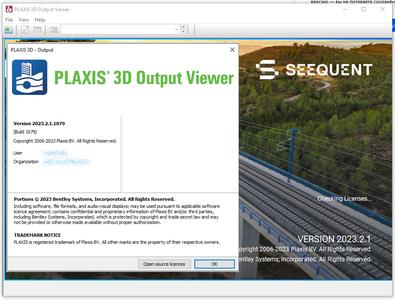
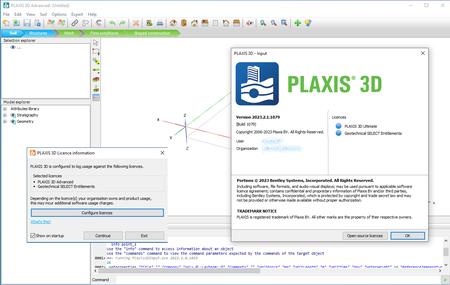
PLAXISis geotechnical analysis software with capabilities to solve common and complex geotechnical problems in soil and rock, including advanced analysis for excavations, foundations, tunnels, and other infrastructure projects.
PLAXIS 2Dis a powerful and user friendly finite element package intended for two-dimensional analysis of deformation and stability in geotechnical engineering and rock mechanics. PLAXIS is used worldwide by top engineering companies and institutions in the civil and geotechnical engineering industry. Applications range from excavations, embankment and foundations to tunnelling, mining and reservoir geomechanics. PLAXIS is equipped with a broad range of advanced features to model a diverse range of geotechnical problems, all from within a single integrated software package. PLAXIS uses predefined structural elements and loading types in a CAD-like environment. This empowers the user with fast and efficient model creation, allowing more time to interpret the results.
PLAXIS 2D Showreel - Dams & Embankments
PLAXIS 3Dis a powerful and user friendly finite element package intended for three-dimensional analysis of deformation and stability in geotechnical engineering and rock mechanics. PLAXIS is used worldwide by top engineering companies and institutions in the civil and geotechnical engineering industry. Applications range from excavations, embankments and foundations to tunnelling, mining and reservoir geomechanics. PLAXIS 3D has advanced features to tackle modelling challenges in the most complex geotechnical projects, that cannot be solved with PLAXIS 2D. Finite element modelling in full 3D has never been easier with a range of CAD-like drawing tools and extrude, intersect, combine and array operations. It's almost like sculpting.
In this showreel, we display some models of dams and embankments made in PLAXIS 3D.
Bentley Systems, Inc.is the global leader dedicated to providing architects, engineers, constructors, and owner-operators with comprehensive architecture and engineering software solutions for sustaining infrastructure. Founded in 1984, Bentley has nearly 3,000 colleagues in more than 45 countries, $500 million in annual revenues, and, since 2001, has invested more than $1 billion in research, development, and acquisitions.

Rapidgator-->Click Link PeepLink Below Here Contains Rapidgator
http://peeplink.in/2dbe1d19aa64
NitroFlare
duuww.setup.rar
Uploadgig Free Links
duuww.setup.rar
Fikper Free Links
duuww.setup.rar.html
Links are Interchangeable - No Password - Single Extraction
